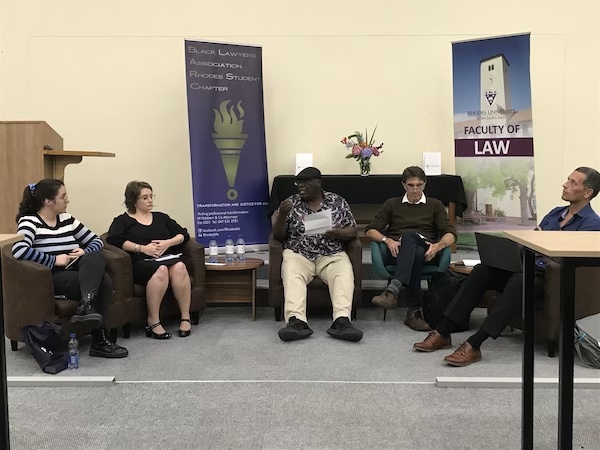By ‘Odidi Matai-Sigudla
On 3 May, the Rhodes University’s Faculty of Law and Black Lawyers Association held a panel discussion on the Israel-Palestine conflict and South Africa’s genocide case.
Dean of Law, Professor Lawrence Juma, Department of Political International Studies Associate Professor Edward Jordaan, School of Journalism and Media Studies senior lecturer Rod Amner, History Department Master students Lauren Delponté and Meghan Vetch, made up the panel. The discussion was on the Israel-Palestine conflict and South Africa’s genocide case to give “a picture of what is actually happening on the ground,” explained Rhodes student Tamuka Murambiwe. “It’s to give a numerous understanding of where the conflict is, where the conflict came from and where it is going.”
Delponté began by laying the foundation of understanding with a brief history of the Israel-Palestine conflict that could be traced back to World War I when Britain needed political and military support from the Ottoman Empire, which Palestine and Israel fell under. “In exchange for our support, Britain promised to support the struggle for an independent Iranian state. They call to make this in the signing of the Balfour Declaration, [stating]Britain promises Zionists they would support the establishment of an Independent Jewish state in the Middle East.”
“When Israel was established in 1948, South Africa was still under the [Apartheid] party government and was the eighth country to officially recognise Israel… People initially thought that the nationalists would not support Israel due to their history of antisemitism,” said Vetch. However, there were people in the Nationalist Party, and throughout white society, who felt that whites in South Africa and Israelis shared a common destiny in that they were both small populations surrounded by hostile neighbours; for white South Africans, it was black states, and for Israel, it was the Arab states. On the other hand, the African National Congress developed close ties with the Palestinian Liberation Organisation. “They were parallel organisations in that they both try to liberate the oppressed, and that essentially paves the way in large part for why South Africa now supports Palestine. Because of the close identification between oppressed peoples in both states.”
When the United Nations (UN) was formed in 1945, the understanding was that there should be no other war experience similar to what the world had witnessed in the Second World War. The idea of peaceful resolution of disputes became central, and organisations and institutions were created to support the work of the United Nations, to hold that identity and character, and to ensure that every dispute that arises will not result in war, stated Juma. One of these institutions of the UN was the International Court of Justice (ICJ), which was tasked with interpreting the UN charter and resolving disputes among states.
“Burundi, Democratic Republic of Congo, North Korea, Russian-Ukraine conflict, South Sudan, Syria,” are some countries involving massive levels of violence and highly oppressive governments, Jordaan stated. When we see a case in which only certain people’s human rights are considered, we know we are in the presence of a political use of human rights. When we see all people’s human rights being considered, we know we are in the presence of a moral law. Because South Africa brought this case to the ICJ, it looks like a moral law, but it is not. South Africa’s case of human rights is highly political, he said.
“There are many challenges facing news organisations in trying to cover conflict as intractable as this one (Israel-Palestine),” said Amner, showing an appreciation to Palestinians on the ground who give a perspective of what is happening when international reporters are not allowed to report on the ground except for when in a controlled space.


